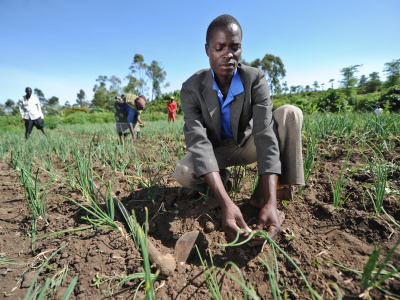
A universal global partnership: wishful thinking? First thoughts on the new EU Commission communication
2015 Global Development Challenges Series - Part 7
2015, the European Year for Development, is a pivotal year for global sustainable development and poverty eradication. It is a response to the fundamental challenges facing the world today.
Yesterday’s European Commission Communication ‘A Global Partnership for Poverty Eradication and Sustainable Development after 2015’, together with the Council conclusions of December 2014, will inform the EU’s position ahead of the Third International Conference on Financing for Development (FFD3) in Addis this July and the UN Summit on the post-2015 agenda in New York this September.
An integration of climate change issues in the global partnership is crucial and is stressed repeatedly. The Communication recognises that any agreement on the Sustainable Development Goals (SDGs) will also have important implications for the negotiations of the UN Framework Convention on Climate Change (UNFCCC) at the Conference of the Parties (COP) in Paris this December.
While in the past such communications have often remained very general without concrete action points, yesterday’s is - much to my delight - accompanied by an annex that lists possible actions for all global players in general, and specific ones for the EU. The Communication lists these nine components as the means to implement the global partnership:
An enabling and conducive policy environment at all levels
The development of capacity to deliver the agenda
The mobilisation and effective use of domestic public finance
The mobilisation and effective use of international public finance
The stimulation of trade to eradicate poverty and promote sustainable development
To drive transformative change through science, technology and innovation
To mobilise the domestic and international private sector
To harness the positive effects of migration
A monitoring, accountability and review framework
Principles or wishful thinking?
While the Communication states that a global partnership will be based on the principles of shared responsibility, mutual accountability and respective capacity - making it a success will not only require implementing policies and mobilising sufficient resources, but also to step up contributions of all countries at their level of capability.
The communication emphasises what a universal agenda means and stresses the importance of promoting more effective and inclusive forms of multi-stakeholder partnerships, underlining the need to get all actors on board. Therefore, nationally-driven agendas based on ownership and leadership through effective institutions, can only be successful when supported by political commitment at the highest level.
The Communication reaffirms the significance of cross sector policy coherence at all policy levels. This is to support the integration of the three dimensions of sustainable development - social, economic and environmental. It further promotes “the sustainable and effective use of all resources, including domestic resources, international public finance, private sector finance and innovative financing.” It sends a strong message to emerging economies and upper-middle-income countries (UMICs) who “should also commit to increasing their contribution to LDCs and set targets and timelines to do so.” High-income countries (HICs) meanwhile “should respect the UN target of 0.15% of GNI for development assistance to LDCs”.
By splitting up the different sets of countries - HICs, UMICs and emerging ones - the Communication tries to avoid the over-simplified distinction between the developed and developing world - which is good, at least when it comes to financial contributions and policy coherence. If this does justice to the diversity of countries is a different question, so perhaps more nuanced criteria to determine responsibilities are needed.
Great emphasis is put on the role of other means of implementation in the form of enabling policies, the regulatory and legal environment, capacity building, trade, innovation and private investments. Action is needed to be taken by all, but countries should work closely together to monitor and review progress on issues of implementation. As a result, the success of the agenda will certainly depend on the quality of the review, monitoring and follow-up framework in place. At the same time, they should be “underpinned by the principles of transparency, inclusiveness and responsiveness, efficiency and effectiveness” - just as the Communication underlines.
More work is ahead
Despite a list of concrete actions in the annex, to “become part of a contract between people, including civil society and the private sector, and governments” the agenda stands or falls with national and local implementation and incentives created for national and local players to drive and own the agenda. The concept of universality and shared responsibility implies that there should be fair differentiate between countries according to defined levels of contribution and ambition - both financial and non-financial.
This is certainly not an easy task but the Communication falls short of addressing it, besides the renewed commitments to reach the target of 0.7% of GNI and the commitment to support various areas of other means of implementation. That most of the EU member states do not reach their own 0.7% target means that further work needs to be done by all involved. At times, the Communication itself does not really convey the message of a true partnership with its partners, as it often tells other countries what they “should and need to do…, should reinforce…, should commit to…” etc, so to further develop and cultivate partnerships requires substantive work in the future.
This, however, is by no means to reduce the significance and important purpose of the Communication. Rather, I point to the challenges and areas where more work needs to be done, so that a post-2015 agenda and the means to implement the highly ambitious goals can be as effective and powerful as envisioned by the Communication.
The views expressed here are those of the author and not necessarily those of ECDPM
Read ‘Finishing the Job and Building Bridges to the Future’ by Amina Mohammed
Read ‘Leaving No One Behind’ by Tony German
Read ‘What Europe Can and Should do for Global Development‘ by Linda McAvan MEP
Read ‘Doing More with Less – Where EU Ambition Meets Sobering Reality’ by Alisa Herrero Cangas and Greta Galeazzi
Read all the material related to the 2015 ECDPM Challenges Paper at our Challenges Dossier


